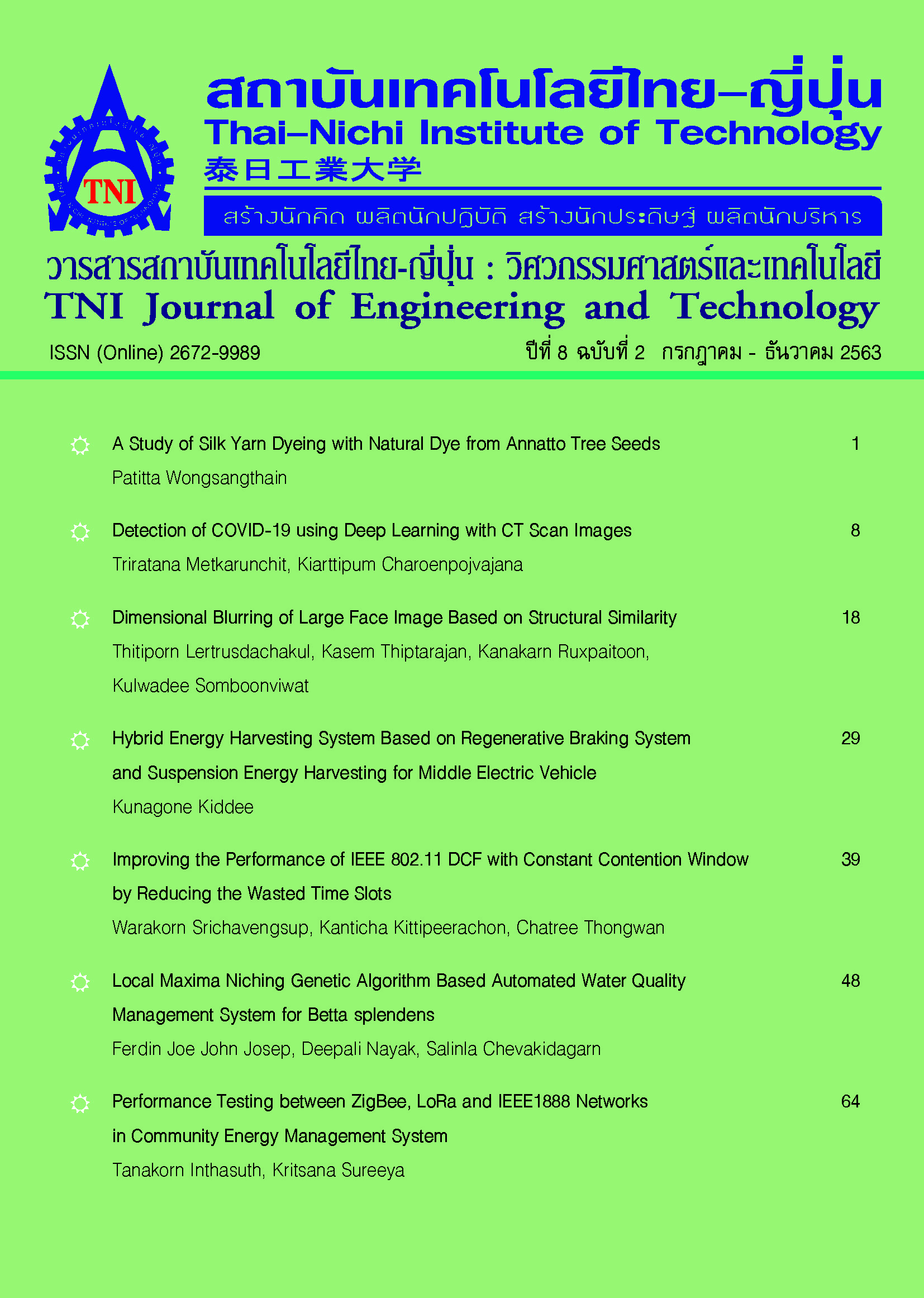Improving the Performance of IEEE 802.11 DCF with Constant Contention Window by Reducing the Wasted Time Slots
Main Article Content
Abstract
In the contention resolution of the IEEE 802.11 DCF algorithm with constant contention window, there may be wasted slots at the end of the frame. This paper proposes two algorithms to improve the performance of IEEE 802.11 DCF algorithm with constant contention window by using the method of reducing the wasted slots at the end of the frame. The first algorithm is reducing wasted slots at the end of last frame (RLF) and the second algorithm is reducing wasted slots at the end of every frames (REF). Based on the results, it is found that the REF algorithm offers superior performance and the RLF algorithm performs better than the IEEE 802.11 DCF with constant contention window algorithm. We can conclude that both proposed algorithms can improve system performance, especially when there are large amounts of slots per frame. The appropriate number of slots per frame should be used in order to ensure optimal system performance.
Article Details
Article Accepting Policy
The editorial board of Thai-Nichi Institute of Technology is pleased to receive articles from lecturers and experts in the fields of engineering and technology written in Thai or English. The academic work submitted for publication must not be published in any other publication before and must not be under consideration of other journal submissions. Therefore, those interested in participating in the dissemination of work and knowledge can submit their article to the editorial board for further submission to the screening committee to consider publishing in the journal. The articles that can be published include solely research articles. Interested persons can prepare their articles by reviewing recommendations for article authors.
Copyright infringement is solely the responsibility of the author(s) of the article. Articles that have been published must be screened and reviewed for quality from qualified experts approved by the editorial board.
The text that appears within each article published in this research journal is a personal opinion of each author, nothing related to Thai-Nichi Institute of Technology, and other faculty members in the institution in any way. Responsibilities and accuracy for the content of each article are owned by each author. If there is any mistake, each author will be responsible for his/her own article(s).
The editorial board reserves the right not to bring any content, views or comments of articles in the Journal of Thai-Nichi Institute of Technology to publish before receiving permission from the authorized author(s) in writing. The published work is the copyright of the Journal of Thai-Nichi Institute of Technology.
References
M. Mitra, Satellite communication, India: Prentice-Hall of India Pvt. Ltd., 2005.
M. Schwartz, Mobile wireless communications, New York, NY, USA: Columbia University Press, 2004.
A. S. Ling and L. B. Milstein, “The effects of spatial diversity and imperfect channel estimation on wideband MC-DS-CDMA and MC-CDMA,” IEEE Transactions on Communications, vol. 57, no. 10, pp. 2988-3000, Oct. 2009.
H. Baek, J. Lim, and S. Oh, “Beacon-based slotted ALOHA for wireless networks with large propagation delay,” IEEE Communications Letters, vol. 17, no. 11, pp. 2196-2199, Nov. 2013.
J. Choi, “Throughput analysis for coded multichannel ALOHA random access,” IEEE Communications Letters, vol. 21, no. 8, pp. 1803-1806, Aug. 2017.
C. Stefanovic, P. Popovski, and D. Vukobratovic, “Frameless ALOHA protocol for wireless networks,” IEEE Transactions on Vehicular Technology, vol. 64, no. 5, pp. 2087-2090, Oct. 2012.
W. S. Jeon and D. G. Jeong, “Combined channel access and sensing in cognitive radio slotted-ALOHA networks,” IEEE Transactions on Vehicular Technology, vol. 64, no. 5, pp. 2128-2133, May 2015.
M. S. Chowdhury, K. Ashrafuzzaman, and K. S. Kwak, “Saturation throughput analysis of IEEE 802.15.6 slotted aloha in heterogeneous conditions,” IEEE Wireless Communications Letters, vol. 3, no. 3, pp. 257-260, Jun. 2014.
M. Karaca and B. Landfeldt, “Approaching optimal centralized scheduling with CSMA-based random access over fading channels,” IEEE Communications Letters, vol. 20, no. 6, pp. 1183-1186, Jun. 2016.
A. Maatouk, M. Assaad, and A. Ephremides, “Energy efficient and throughput optimal CSMA scheme,” IEEE/ACM Transactions on Networking, vol. 27, no. 1, pp. 316-329, Feb. 2019.
L. Dai and X. Sun, “A unified analysis of IEEE 802.11 DCF networks: Stability, throughput, and delay,” IEEE Transactions on Mobile Computing, vol. 12, no. 8, pp. 1558-1572, Aug. 2013.
X. Zhang, “A new method for analyzing nonsaturated IEEE 802.11 DCF Networks,” IEEE Wireless Communications Letters, vol. 2, no. 2, pp. 243-246, Apr. 2013.
R. Wang, J. Zhang, and X. Zou, “Performance analysis and optimization of IEEE 802.11 DCF with constant contention window,” in Proc. 2008 ISECS International Colloquium on Computing, Communication, Control, and Management, Guangzhou, China, Aug. 2008, pp. 407–411.


